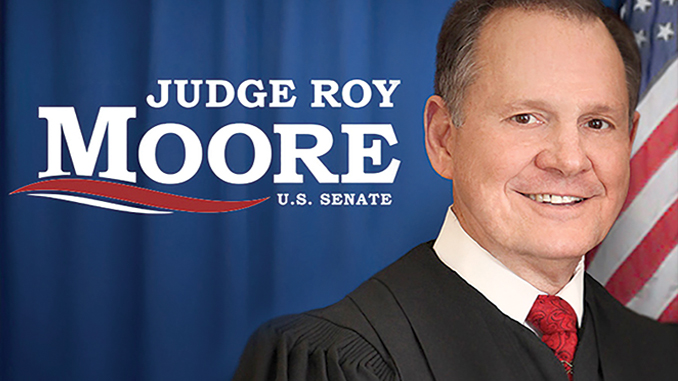
• Polling reveals “10 Commandments judge” is a good bet to win GOP run-off primary
By Mark Anderson
Not unlike former Arizona Sheriff Joe Arpaio (see pages 14-15), former Alabama Chief Justice Roy Moore has twice been put out to pasture, politically, for not goose-stepping to the twisted tune of modern political correctness. Yet the resilient champion of the Ten Commandments in the courtroom and in the public square has emerged as the lead candidate in internal polling for his state’s open Senate seat, according to several sources. Richard Winger of “Ballot Access News,” a noted expert on state elections and their tangled laws designed in most cases to freeze out minor-party candidates, wrote that Quin Hilyer, an Alabama resident and an observer of Alabama politics and government, wrote a New York Times op-ed “that predicts that Roy Moore will win the Sept. 26 Republican run-off primary for U.S. Senate, and also the Dec. 12, 2017 special election.
There won’t be anyone on the ballot in the general election except the Republican and Democrat nominees, because Alabama petition requirements for non-presidential office are so severe.” While the polling numbers naturally are subject to shifts, the Washington daily Politico noted that internal polling, as of Aug. 31, showed Moore leading at 31%, with current Sen. Luther Strange second at 23%. Rep. Mo Brooks was coming in third at 21% as of this writing. The remaining dozen so-called lesser candidates were shy of 5%.
Moore’s candidacy came about because Sen. Jeff Sessions, a former Alabama state official, was named as attorney general by President Donald J. Trump. Now-former Gov. Robert Bentley appointed Strange to Sessions’s vacated seat. But when Bentley was forced to step down earlier in 2017 amid scandal, his replacement, Gov. Kay Ivey, scheduled a special election. “Moore,” wrote Daniel Strauss of Politico, “has
relied on a solid base of conservative and religious supporters that grew during two stints on the state Supreme Court, which both ended when he was removed [from office] for defying federal orders to take down a statue of the Ten Commandments from government grounds and to issue same-sex marriage licenses.” Meanwhile, the Republican machine’s backing of Strange has produced a rather strange set of circumstances. A super PAC called the Senate Leadership Fund, run by cohorts of Senate Majority Leader Mitch McConnell (R-Ky.), is among those backing Strange.
Even President Trump has endorsed Strange. “But the super PAC’s main focus had been on preventing Brooks, a firebrand member of the House Freedom Caucus and avowed critic of McConnell, from overtaking Strange,” Strauss clarified. “Brooks’s congressional district will become a key swing region in the runoff between Moore and Strange, slated for Sept. 26.”
Moore first rose to national prominence as a county circuit judge, when he refused to remove a wooden plaque of the Ten Commandments and to cease prayers before his court sessions. After a successful race for state chief justice in 2000, Moore stuck to his pledge to install the Commandments at the state Supreme Court. A sculptor he hired created a 5,000-pound granite monument, and Moore had it placed in the Supreme Court building’s rotunda.
His refusal to remove it got him removed from office in 2003, but he won again in 2012, so his mettle has been tested. Moore, suspended in 2016 for refusing to follow the Supreme Court’s ruling allowing same-sex marriage, maintains he had the authority to order the state’s 67 county probate judges not to issue same-sex-couple “marriage” licenses. The suspension happened after the notorious Southern Poverty Law Center—which is based in Alabama and operates on the basis of cultural Marxism to advance political correctness and fight against Christian ideas of any kind, to any degree, in the public domain—filed an ethics complaint against Moore.
His suspension was issued by a judicial ethics committee one year ago, in September 2016, which barred Moore from serving as state chief justice for the rest of his term, which would have ended in 2019. He eventually resigned. Moore had directed lower-court judges not to issue marriage licenses to same-sex couples because Alabama’s state constitution and laws defined marriage as between a man and a woman. Moore reasoned that states have the legal authority to define what marriage is under their laws, and that the federal government lacks such power—short of a constitutional amendment.
This shows that Moore understands the often overlooked fact that the federal government, whenever it acts without first altering its Constitution to provide the authority it seeks, is acting unlawfully in the final analysis. While he’s being outspent, Moore “could be an unusually strong obstacle for Strange in an age of unsettled Republican primaries,” Strauss wrote at Politico. “Moore is hoping his years of high-profile religious fights on the Alabama Supreme Court will fuel his run more than a high-budget campaign would have.”
Mark Anderson is a longtime newsman now working as the roving editor for AFP. Email him at [email protected].
